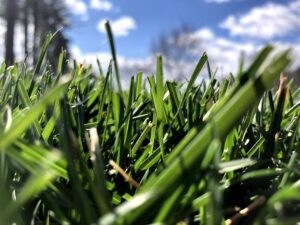
A Guide to common Lawn Care Questions: Insights from a Lawn Care provider near you.

Maintaining a beautiful, healthy lawn requires knowledge, dedication, and a bit of elbow grease. As a lawn care company here in the Wake Forest, NC area, we frequently receive a variety of questions from homeowners eager to keep their lawns lush and green. In this blog post, we’ll address some of the most common lawn care questions and provide expert tips to help you achieve the perfect lawn. Whether you’re dealing with weeds, pest, or simply want to enhance your yard’s curb appeal, we’ve got you covered.
1. How Often Should I Water My Lawn?
Watering is crucial for lawn health, but it’s important to get it right. In the Raleigh, NC area, we recommend watering your lawn deeply and infrequently. Aim for about 1 to 1.5 inches of water per week, including rainfall. The best time to water is early in the morning before the heat of the day. This minimizes evaporation and allows the grass to absorb the moisture efficiently. Avoid watering in the evening as this can lead to fungal disease
2. What’s the Best Way to Control Weeds?
Weeds are the bane of every homeowner’s existence. The key to effective weed control is a combination of pre-emergent and post-emergent herbicides. Pre-emergent herbicides prevent weed seeds from germinating and should be applied in early spring. Post-emergent herbicides tackle weeds that have already sprouted. Additionally, maintaining a healthy, thick lawn can crowd out weeds and reduce their growth. Regular mowing, proper fertilization, and overseeding can all contribute to a weed-free lawn.
3. How Do I Deal with Lawn Pests?
Lawn pests can cause significant damage if left unchecked. Common pests in our area include grubs, chinch bugs, and sod webworms. Identifying the pest is the first step in addressing the problem. For example, grubs can be controlled with insecticides applied in late summer when they are most active. Chinch bugs and sod webworms can be treated with targeted insecticides as well. Natural predators, such as birds and beneficial nematodes, can also help keep pest populations in check.
4. What Type of Grass is Best for My Lawn
Choosing the right grass https://distinctlawns.com/sod-installation/for your lawn depends on several factors, including climate, soil type, and sun exposure. In Wake Forest, popular choices include Bermuda grass, Zoysia grass, and Tall Fescue. Bermuda grass thrives in full sun and is drought-resistant, making it ideal for hot summers. Zoysia grass is also heat-tolerant and has a dense growth habit that crowds out weeds. Tall Fescue is a cool-season grass that performs well in shaded areas and remains green throughout the winter.
5. How Can I Improve My Soil Quality?
Healthy soil is the foundation of a vibrant lawn. To improve soil quality, start with a soil test to determine its pH and nutrient levels. Based on the results, you can amend the soil with lime to adjust pH or add organic matter such as compost to improve soil structure. Aeration, which involves removing small plugs of soil, can also enhance soil health by reducing compaction and increasing oxygen flow to the roots.
6. When and How Should I Fertilize My Lawn?
Fertilizing your lawn provides essential nutrients that promote healthy growth. Fro the triangle we recommend a balanced fertilizer applied three to four times a year depending on grass type. The first application should be in early spring when the grass begins to grow. Follow up with applications in late spring, summer, and early fall. Use a spreader to ensure even distribution and water the lawn after fertilizing to help the nutrients penetrate the soil.
7. How Can I Prevent Lawn Diseases?
Lawn diseases can be caused by fungi, bacteria, or viruses and are often the result of poor lawn care practices. To prevent diseases, ensure proper watering, mowing, and fertilization. Avoid overwatering and mow at the appropriate height for your grass type. Thatch buildup can also contribute to disease, so dethatch your lawn as needed. If you notice signs of disease, such as discolored patches or mold, treat it promptly with fungicides or other appropriate measures.
8. What is the Proper Mowing Height for My Grass?
Mowing height can significantly impact your lawn’s health. For Bermuda https://content.ces.ncsu.edu/bermudagrass-lawn-maintenance-calendar grass, a mowing height of 2 to 3 inches is recommended. Zoysia grass should be mowed at 2 to 3 inches, while Tall Fescue should be kept at 3 to 4 inches. Mow frequently enough to remove no more than one-third of the grass blade at a time, and ensure your mower blades are sharp to prevent tearing the grass.
Conclusion
Wake Forest, NC https://www.wakeforestnc.gov/ is an amazing place to live and can offer just about any type of lawn you are looking for with the right knowledge and practices. By addressing common lawn care questions and following expert advice, you can enjoy a lush, green lawn year-round. Remember, a healthy lawn not only enhances your home’s curb appeal but also provides a space for relaxation and outdoor activities. If you need professional help, don’t hesitate to reach out to your local lawn care experts for personalized advice and services.
If you enjoy learning about grass as much as we do check out this article from NC State https://content.ces.ncsu.edu/carolina-lawns
Feel free to contact us via text or email with any additional questions or to schedule a consultation. Happy lawn care!